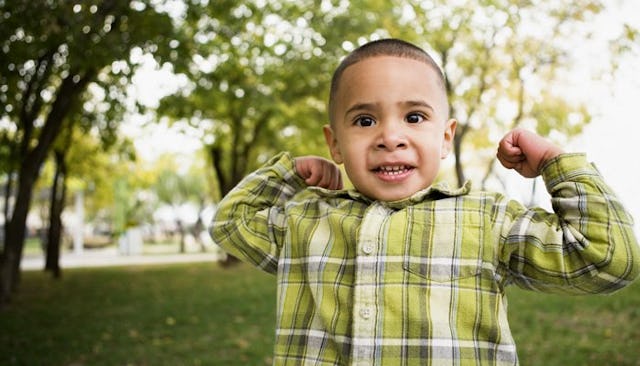What Are We Teaching Boys About Masculinity?

There’s a slightly strange man who lives on my block. I say “slightly” because there’s nothing obviously wrong with him. He’s neat and clean, chats with passers-by, and tends his front yard. But something tells me to be on guard. He often greets my 5-year-old son by commenting on his clothing, which lately is a Batman shirt, every day. So far, no problem. But recently he crouched in front of my boy and said, with a very serious look on his face, “You’re a big help to your mom, aren’t you? Aren’t you? Look me in the eye. Look me in the eye.”
My son wasn’t looking him in the eye—he was looking at the sidewalk, as children do when they think they’re being reprimanded.
“Look me in the eye,” the man instructed, for the third time, and I finally said, pleasantly, “He doesn’t have to look you in the eye.” The man was surprised, but he stood up and said, “Well, you’re a big help to your mom.”
Now I’m sure that man would frame that story as an overindulgent mother failing to teach her child to respect his elders. I frame it as a weird kind of exercise in dominance that some men do to boys.
When you have kids, you quickly become aware of all the gender-conditioning that is part of our culture—conditioning that, when you see it acted out on children, makes the absurdity of gender roles crystal clear. (I recently watched a woman at the playground reprimand her daughter 15 times in an hour for showing her frilly underwear. Who put the little girl in the dress and underwear in the first place?)
This conditioning for boys is less obvious to me, probably because I’m conditioned to see how boys act as typical—the baseline—while girls are socialized to be “feminine,” which means something different from “normal.” But we do socialize boys to fit our ideas of masculinity. I, like many parents I know, worry that my son doesn’t stand up for himself, that he doesn’t, as a friend of mine says about her son, “advocate” for himself. Collectively, we seem to be pretty worried about our boys being steamrolled in a way that I haven’t really seen people worry about girls.
Now certainly, both boys and girls should learn to stand up for themselves, but we do seem to be better at socializing girls to be more inclusive, to consider the other person’s feelings, to tend to their friendships. An article in Pacific Standard about men and friendships explains that men are the loneliest demographic, because they just don’t learn the social skills that women do to tend and maintain friendships.
I wonder if our insistence that boys be tough, don’t cry and “stand up for themselves” is affecting how they develop and sustain relationships. My neighbor, with his (possibly generational) insistence that my son demonstrate deference, made me consider if how we socialize boys has more to do with hierarchy and dominance than with empathy and support.
Now, I know that girls get the message—they get this message loud and clear—to prioritize others’ needs over their own, to smooth things over, to keep the peace. And yes, too much of that is indeed harmful. Girls and women do need to pay attention to their own needs, to stand up for themselves.
But boys also need to see things from the other person’s point of view, to turn the other cheek, to walk away from an unpleasant situation rather than “win.” I hope that my son is inclusive in school towards kids who are shy or quiet or otherwise feeling lost in a big kindergarten class. I hope he asks them to join in on games at recess. They can play side by side. No one has to look him in the eye.
This article was originally published on